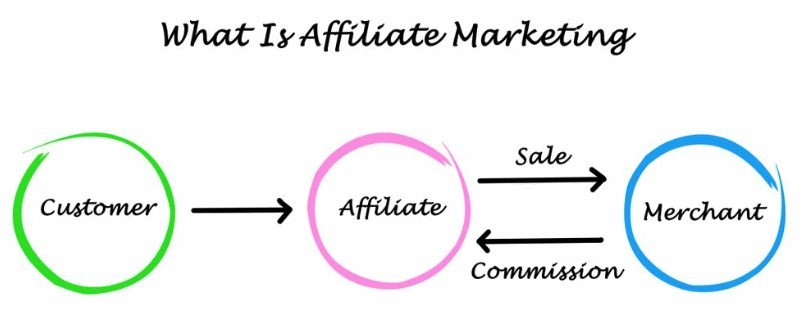So you’re thinking about starting your own business, huh? That’s great!
But now you’re faced with the decision of whether to go with affiliate marketing or SMMA (Social Media Marketing Agency).
Don’t worry, I’ve got you covered. In this article, we’re going to dive deep into the pros and cons of each business model, so by the end, you’ll have a better idea of which one suits you best.
Let’s start with affiliate marketing. It’s like being a middleman, connecting customers with products or services and earning a commission for each sale.
The great thing about affiliate marketing is that you don’t need to create your own products or deal with customer service.
You can promote products in any niche and make money while you sleep. However, competition can be tough, and it takes time to build a passive income stream.
On the other hand, there’s SMMA, which involves helping businesses grow their online presence on social media platforms.
If you love tinkering with Facebook ads, Instagram campaigns, and content creation, SMMA might be the right choice for you. It’s a fast-paced industry with great potential for growth.
However, it requires continuous learning and staying up-to-date with the latest social media trends. Plus, you’ll be dealing with clients directly, which means you need strong communication and interpersonal skills.
Excited to know more? Stay tuned for the rest of the article where we’ll discuss income potential, scalability, and the challenges of both affiliate marketing and SMMA.
By the end, you’ll have the knowledge you need to make an informed decision and start your journey as a successful online entrepreneur.
Get This Action-Packed Free Affiliate Marketing Course
Affiliate Marketing Vs SMMA: Which Is Better for You?
Definition of Affiliate Marketing

Let’s start by understanding what affiliate marketing is. Affiliate marketing is a performance-based marketing model where individuals, also known as affiliates, promote products or services on behalf of a company.
Affiliates earn a commission for every sale or lead generated through their promotional efforts. This business model allows individuals to earn passive income by leveraging their online presence or marketing skills.
Advantages of Affiliate Marketing
One of the biggest advantages of affiliate marketing is the low barrier to entry. You don’t need to create your own products or services, handle customer support, or deal with inventory management.
All you need is a platform to promote the products or services and a solid marketing strategy. Additionally, affiliate marketing offers the potential to earn passive income, as you can continue to earn commissions from your promotional efforts even after the initial sales.
Disadvantages of Affiliate Marketing
While affiliate marketing has its perks, it also comes with its own set of challenges. One disadvantage is the reliance on the company whose products or services you are promoting. If they change their terms or decide to discontinue the affiliate program, your income could be affected.
Additionally, competition can be fierce in the affiliate marketing space, which means you need to invest time and effort in standing out from the crowd.
Income Potential of Affiliate Marketing

The income potential in affiliate marketing can vary widely. Some successful affiliates are able to earn six-figure incomes, while others may only make a few hundred dollars per month.
The key to maximizing your income potential lies in selecting the right affiliate programs, implementing effective marketing strategies, and continuously optimizing your promotional efforts.
Get This Action-Packed Free Affiliate Marketing Course
Skills Required for Affiliate Marketing
To succeed in affiliate marketing, you need to develop certain skills. These include digital marketing skills such as search engine optimization (SEO), content creation, social media marketing, and email marketing.
You also need to have strong communication and persuasion skills to effectively promote the products or services to your target audience.
Popular Affiliate Marketing Programs
There are numerous affiliate marketing programs available, each offering different products or services to promote.
Some popular affiliate programs include Amazon Associates, ClickBank, Commission Junction, and ShareASale.
It’s essential to research and choose affiliate programs that align with your niche and offer competitive commissions.
Successful Affiliate Marketing Strategies
To increase your chances of success in affiliate marketing, it’s crucial to develop effective strategies.
Some proven strategies include creating high-quality content, utilizing SEO techniques to drive organic traffic, building an engaged email list, and leveraging social media platforms for promotion.
Additionally, staying updated with industry trends and continuously testing and optimizing your strategies will help you stay ahead of the competition.
Tips for Starting an Affiliate Marketing Business
If affiliate marketing seems like the right fit for you, here are some tips to help you get started:
- Find your niche: Choose a specific area of interest or expertise to focus your affiliate marketing efforts on.
- Research and select profitable affiliate programs: Look for programs that offer competitive commissions and products or services that are in demand.
- Build your online presence: Create a website or blog where you can promote the affiliate products, and establish a strong social media presence to reach a wider audience.
- Create valuable content: Produce high-quality content that educates and engages your target audience, while subtly promoting the affiliate products.
- Implement effective marketing strategies: Utilize SEO techniques, social media marketing, and email marketing to attract and convert potential customers.
- Continuously track and optimize your efforts: Monitor the performance of your affiliate campaigns, identify areas for improvement, and make necessary adjustments to maximize your earnings.
Now that we understand what affiliate marketing is, let’s turn our attention to SMMA.
Definition of SMMA

SMMA, or Social Media Marketing Agency, is a business model where individuals or agencies offer social media marketing services to businesses.
These services include content creation, social media management, advertising campaigns, and analytics. SMMA professionals help businesses establish a strong online presence, drive traffic to their websites, and engage with their target audience on social media platforms.
Advantages of SMMA
One of the significant advantages of starting an SMMA is the demand for social media marketing services.
In today’s digital age, businesses understand the importance of an active and engaging social media presence, and they’re willing to invest in professional services to achieve their marketing goals. This creates a potentially lucrative market for SMMA professionals.
Additionally, SMMA offers flexibility and scalability. You can start with small projects and gradually expand your client base as you gain experience and expertise. Moreover, you have the opportunity to work with a variety of businesses, which keeps the work dynamic and interesting.
Disadvantages of SMMA
Like any other business model, SMMA also has its downsides. One of the challenges is the need to constantly stay updated with the latest social media trends and algorithms.
Social media platforms are continually evolving, and what works today may not work tomorrow. Keeping up with these changes and adapting your strategies can be time-consuming.
Another disadvantage is the need for effective client management and communication skills.
As an SMMA professional, you’ll be working closely with clients, and understanding their needs and expectations is crucial for delivering successful campaigns. This requires strong interpersonal skills and the ability to handle client feedback and revisions.
Income Potential of SMMA
The income potential of SMMA can be quite promising. As you gain experience and build a solid reputation, you can charge higher rates for your services.
Additionally, by offering additional services such as content creation or advertising campaigns, you can increase your earning potential.
However, it’s important to note that establishing yourself as an SMMA professional can take time, especially in a competitive market.
Skills Required for SMMA
To excel in SMMA, you need to acquire specific skills. These skills include social media management, content creation, digital advertising, data analysis, and client management.
Additionally, staying updated with industry trends and platform changes is crucial to deliver impactful and relevant campaigns for your clients.
Popular SMMA Services
SMMA offers a wide range of services to cater to the diverse needs of businesses.
Some popular services include social media account setup and optimization, content creation and curation, community management, influencer marketing, paid advertising campaigns, and analytics and reporting.
By understanding the specific requirements of your clients, you can offer tailored solutions that yield results.
Tips for Starting an SMMA

If starting an SMMA aligns with your goals, here are some tips to help you get started:
- Identify your niche: Determine the industries or types of businesses you want to specialize in and develop expertise in their specific social media marketing needs.
- Build your portfolio: Offer your services to businesses at discounted rates or even for free, in exchange for testimonials and case studies that showcase your skills.
- Stay updated with industry trends: Read industry blogs, attend webinars, and participate in online communities to stay informed about the latest social media marketing strategies and platform updates.
- Develop strong communication skills: Successful client management involves effective communication, active listening, and the ability to understand and deliver on client expectations.
- Network and collaborate: Build relationships with other professionals in the digital marketing industry. Collaborating with complementary service providers can expand your reach and offering.
- Continuously learn and optimize: Analyze the performance of your campaigns, experiment with different strategies, and adapt your approach based on the outcomes. Learning from both successes and failures is crucial for growth.
Now that we have explored both affiliate marketing and SMMA, let’s compare them based on different factors to help you in your decision-making process.
Factors to Consider
Investment Required
In terms of investment, affiliate marketing usually requires a lower upfront investment compared to starting an SMMA. With affiliate marketing, you may only need to invest in a domain name, web hosting, and some marketing tools.
However, keep in mind that investing in quality content creation, SEO optimization, and paid advertising can significantly enhance your affiliate marketing efforts.
On the other hand, starting an SMMA may require more significant upfront costs.
You may need to invest in professional software and tools, advertising budgets for client campaigns, and possibly hiring team members if your business grows.
It’s crucial to carefully plan your budget and allocate resources effectively to ensure profitability.
Time Commitment
Both affiliate marketing and SMMA require a significant time commitment to achieve success.
In affiliate marketing, you need to invest time in creating high-quality content, optimizing your website for SEO, building an engaged audience, and continuously monitoring and optimizing your promotional efforts.
Keep in mind that it may take time to see substantial results, especially if you’re starting from scratch.
Similarly, in SMMA, building a client base and establishing your reputation takes time and effort.
You’ll need to dedicate time to client management, content creation, and advertising campaigns, and staying updated with industry trends.
Being consistent and providing excellent service is crucial for client retention and referrals.
Level of Knowledge and Expertise
Affiliate marketing allows individuals with different levels of knowledge and expertise to start earning passive income.
While having prior experience in marketing or sales can be beneficial, it’s possible to learn and develop the required skills along the way.
By continuously learning and adapting your strategies, you can succeed in the affiliate marketing space.
On the other hand, starting an SMMA requires more specialized knowledge and expertise in social media marketing.
Understanding the various social media platforms, algorithms, content creation, and analyzing campaign data are essential skills for an SMMA professional.
It’s crucial to invest time in learning and staying updated with the latest industry trends to deliver effective strategies for your clients.
Potential for Passive Income

Affiliate marketing has a significant potential for generating passive income. Once you have established your online presence and have a consistent flow of visitors to your website or social media platforms, you can continue to earn commissions from your affiliate promotions.
This means that even when you’re not actively promoting the products or services, you can still earn income.
In SMMA, the potential for passive income is limited.
While you may have recurring clients who require ongoing services, such as content creation or social media management, the majority of your income comes from actively managing and delivering campaigns for your clients.
This means that to maintain a consistent income in SMMA, you need to consistently attract new clients or expand your services.
Scalability
Both affiliate marketing and SMMA allow for scalability but in different ways.
In affiliate marketing, scalability is primarily achieved by expanding your online presence and reaching a larger audience.
As you attract more visitors and build a loyal following, your promotional efforts can yield more significant results, potentially leading to increased income.
In SMMA, scalability often involves expanding your client base, hiring team members, or offering additional services.
By delivering exceptional results to your clients and ensuring client satisfaction, you can build a strong reputation and attract more clients.
However, keep in mind that scaling an SMMA requires careful management and maintaining the quality of your services as you grow.
Market Demand
Both affiliate marketing and SMMA operate in industries with high market demand. With the rise of e-commerce and online businesses, the need for effective marketing strategies is more significant than ever.
However, the market demand for SMMA services may be more immediate, as businesses often prioritize social media marketing to establish their online presence and attract customers.
Affiliate marketing, on the other hand, relies on individual affiliates to effectively promote products or services, which may require more time and effort to build trust and establish a loyal customer base.
Personal Interests and Skills
One of the factors that can influence your decision between affiliate marketing and SMMA is your personal interests and skills.
Consider what you enjoy doing and where your strengths lie. If you have a passion for writing, creating content, and engaging with an audience, affiliate marketing may be a better fit for you.
On the other hand, if you have a creative streak, enjoy analyzing data, and love helping businesses achieve their marketing goals, SMMA may be the right path for you.
Now that we have explored the different factors to consider, let’s compare the income potential of affiliate marketing and SMMA.
Comparison of Income Potential

Affiliate Marketing Earnings
In affiliate marketing, the income potential can vary significantly. Some successful affiliates have been able to earn six-figure incomes through their promotional efforts.
However, it’s important to note that achieving such levels of success requires dedication, continuous learning, and smart marketing strategies.
Starting small and gradually scaling your efforts can lead to significant income growth over time.
Earnings Potential in SMMA
Similar to affiliate marketing, the earnings potential in SMMA can also be lucrative. However, building a successful SMMA requires establishing a solid reputation, delivering exceptional results, and continuously expanding your client base.
As you gain experience and expertise, you can increase your rates and earn higher-income levels. It’s important to note that starting an SMMA requires more upfront investment and ongoing expenses compared to affiliate marketing.
Factors Affecting Income Potential
The income potential in both affiliate marketing and SMMA is influenced by various factors.
These factors include the niche you choose to operate in, the quality of your marketing strategies, the competitiveness of the market, the demand for your services or the products you’re promoting, and the level of competition.
By understanding these factors and adapting your approach, you can maximize your income potential in either business model.
Now that we have compared affiliate marketing and SMMA based on different factors, let’s take a look at the growth and future opportunities in both industries.
Growth and Future Opportunities

Trends in Affiliate Marketing
Affiliate marketing continues to evolve with advancements in technology and changes in consumer behavior.
With the growth of e-commerce and the increasing adoption of digital platforms, the potential for affiliate marketing is boundless.
Additionally, emerging trends such as influencer marketing and the rise of niche affiliate programs provide new opportunities for affiliates to tap into untapped markets.
Trends in SMMA
The SMMA industry is also subject to continuous change and evolution. As social media platforms introduce new features and algorithms, SMMA professionals need to adapt their strategies accordingly.
Additionally, emerging trends such as video marketing, live streaming, and interactive content provide exciting opportunities for SMMA professionals to create engaging campaigns for their clients.
Emerging Opportunities in Affiliate Marketing
In affiliate marketing, there are several emerging opportunities to explore. One such opportunity is the growth of affiliate programs in the software-as-a-service (SaaS) industry.
With the increasing number of businesses relying on software solutions, promoting SaaS products can lead to higher commissions and long-term recurring income.
Additionally, the rise of affiliate marketing in emerging markets presents untapped potential for affiliates to enter new markets.
Emerging Opportunities in SMMA
In SMMA, emerging opportunities lie in industries that are yet to fully embrace social media marketing. As traditional businesses recognize the importance of online presence, there is a high demand for SMMA services in sectors such as healthcare, finance, and professional services.
By specializing in these industries, you can position yourself as an expert and create a niche market for your SMMA.
Now that we have explored the growth and future opportunities in affiliate marketing and SMMA, let’s take a look at some success stories in both industries.
Success Stories
Affiliate Marketer Success Stories
- Pat Flynn: Pat Flynn, the founder of Smart Passive Income, is a renowned affiliate marketer who has achieved significant success in the industry. Through his transparent approach, high-quality content, and effective marketing strategies, Pat has been able to generate a consistent six-figure income from affiliate marketing. His success story showcases the potential of affiliate marketing when combined with authenticity and providing value to the audience.
- Michelle Schroeder-Gardner: Michelle Schroeder-Gardner is the creator of the personal finance blog Making Sense of Cents. Through her blog, Michelle has become a highly successful affiliate marketer, earning over $1 million per year. She shares her experiences and strategies to help other aspiring affiliate marketers achieve financial success through her online courses and blog posts.
SMMA Success Stories
- Tai Lopez: Tai Lopez is a well-known entrepreneur and the founder of several successful businesses, including an SMMA. Through his social media marketing agency, Tai has helped numerous clients achieve their marketing goals by leveraging social media platforms. His success showcases the potential of SMMA when combined with effective strategies and delivering tangible results for clients.
- Gary Vaynerchuk: Gary Vaynerchuk, also known as Gary Vee, is a serial entrepreneur and social media marketing expert. He is the CEO of VaynerMedia, a full-service digital marketing agency that offers SMMA services. Gary’s success story exemplifies the potential of SMMA when combined with a deep understanding of social media platforms and a strong work ethic.
Conclusion: Affiliate Marketing Vs SMMA
In conclusion, both affiliate marketing and SMMA offer unique opportunities and challenges. Affiliate marketing allows individuals to earn passive income by promoting products or services, while SMMA provides a chance to work with clients and deliver impactful social media marketing campaigns. The decision between affiliate marketing and SMMA depends on factors such as personal interests, skills, income potential, and the level of commitment you’re willing to invest.
Before diving into either business model, it’s essential to research, develop the necessary skills, and create a solid plan for success. By putting in the effort and continuously learning and adapting, you can achieve your entrepreneurial goals in either affiliate marketing or SMMA. Remember, success in either industry requires dedication, persistence, and the willingness to continuously grow and improve.
Related Post: Affiliate Marketing Without Social Media



